| Woodland Indian Lifeways Program |
The Camp Exhibit:
Our camp is an inviting area for visitors to explore and learn. Many of our items are displayed inside or about the outside work space, hearth area, and structure. Our structure design is based on a temporary camp (ex. hunting or sugar camp) and can vary from an A-frame to lean-to to shade shelter depending on season and local traditions. Our structures are usually covered with natural reed mats, bark, and/or trade canvas. View more pictures by clicking on camp photos.
Cultural Items on Display:
We display over 100 cultural items and re-created artifacts* representing over 16 tribes and Native communities of the Northeast, pre-contact through the mid 1800's. Examples include: a Mississippian style woodpecker engraved shell gorget, Mississippian style duck pottery bowl and beaver bowl, mica and shell necklace, copper jewelry, twined skirt and shoulder bags, Hopewell style crane and fish platform pipe, early clay tube pipe, Micmac stone pipe, Iroquois bow with carved faces, Great Lakes strap dresses (proto-contact and post-contact), Abnaki woman's birch bark dance hat, bear paw style snow shoes, late style Lenape beaded pouch, early style Lenape muskrat tobacco pouch, wampum bag, Shawnee style walnut dyed and quillworked hunting bag, beaded Hudson Bay Company design triangle pouch, Miami style ribbon applique skirt, British coat, tri corn hat, top hat, Great Lakes hood, corn husk shoe, Iroquois style corn husk dolls, Ojibwa style cloth doll, pottery and trade iron/copper kettles, stone and trade iron axes, fish hooks of bone and copper and trade iron, gill nets, hoop net, catching basket, New England and Western Great Lakes style lacrosse sticks, shinny and doubleball sticks, hoop and pole game, children's toys and dolls, cradleboard, reed mat baby hammock, gourd containers, baskets and pouches made out of bark, wood, and natural fibers, some Native dehydrated storage foods (for a program that highlights Native foods to a greater degree, please click on Native Foods) and much more. To view pictures of some of these items, please click on cultural collection. We also usually bring one of two historical style muskets (Southern rifle or Harpers Ferry), so we ask if fire-arms of any kind are restricted at your event (as with many Powwows) to please specify.
*Our items are not actually historic or artifacts. Our items are re-creations based on museum pieces and historic paintings, engravings, and descriptions.
|
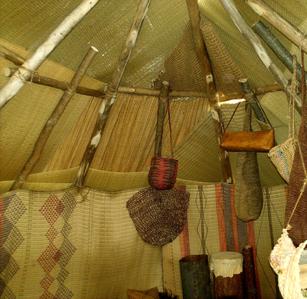 |
| Inside the mat covered A-frame. |
|
|
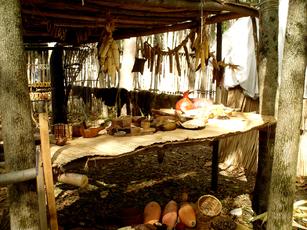 |
| Outdoor work space and shade shelter. |
|
|
 |
| Powwow dancer plays with our doubleball set. |
|
|
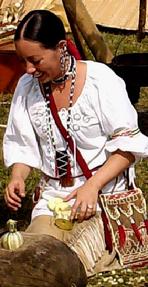 |
| Jessica prepares squash for a meal. |
|
| An Interactive Format:
Friendly interpretation is the heart of our programs. Face to face conversation and encouraging questions is standard rule for us. We offer many hands-on learning opportunities for visitors and especially children such as grinding corn using a wooden mortar and pestle, sifting cornmeal with special baskets, stringing squash rings, using a pump drill, guessing animals by their furs (and learning their names in Miami), and more. Plus, when space allows, children can try their hand at corn cob darts, ring and pin games, a version of hacky-sack (Ho-Chunk), playing catch using doubleball and lacrosse rackets or passing using shinny sticks (Menominee,Ojibwa), etc.
Prices:
Price starts at $250 per day with full camp set-up, and $200 per day without (the camp structure), plus travel and possible hotel fare. Discounts are available for 3+ consecutive days. There is no booking fee, however a contract or 'Booking Agreement' may be requested. We can provide this. For more info or to schedule, please contact Jessica at events@woodlandindianedu.com.
|
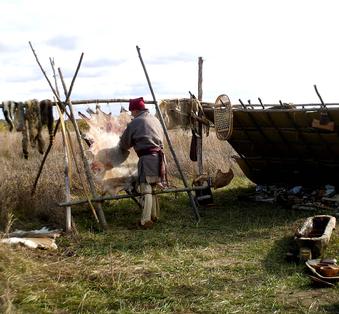 |
| Mark cleans a deer hide. We like to keep at least one on-going demo for the public such as light cooking, hide-tanning, cattail mat making, etc. |
|
|
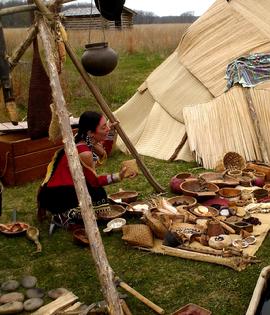 |
| Jessica explains some of the foods and utensils on display. |
|
|
|